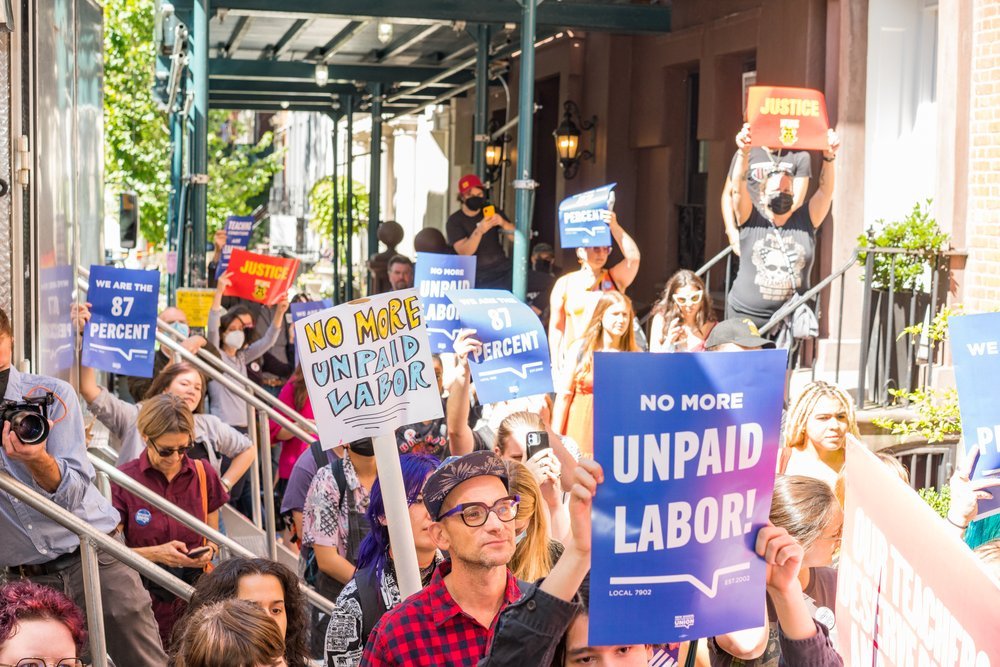A Statement from the Workers of the Tishman Center on the Strike
Image via The New School Part-Time Faculty Union
Archived from our statement published December 6, 2022. The New School and the Part-Time Faculty Union have now reached an agreement; see the union’s blog for details.
As we enter into the fourth week of the part-time faculty strike at The New School, the staff and faculty of the Tishman Center reflect on this critical moment and what it means for us as a Center that works to build community and support social justice movements. The Tishman Center and its community exists between the intersection of The New School’s deep history of radical theory and practice, and the integral relationships formed through our collective work with movements for social justice. Part-time faculty, often practitioners in their fields, are critical contributors to the University’s culture, impact, and reputation. The crises facing part-time faculty and students at our university reflect larger systemic, structural issues in many institutions and sectors of our society; issues that the COVID-19 crisis and recent economic turmoil have exacerbated. These issues have also impacted many of the staff at the university, with layoffs conducted during the pandemic still fresh in all of our minds. We must remember that a culture of mutual support and respect must be cultivated not only within our Center but also within the university as a whole.
The ability of workers, educators, students, and all members of our community to live dignified, thriving lives is premised on having fair wages, healthcare, and safe working conditions. The contradictions between the ambition of our values that uphold social justice, diversity, equity, and inclusion and the current conditions highlighted by the strike speak to the transformative change we must undertake collectively to move forward.
Being in solidarity with striking faculty disrupts our classrooms, students' lives, especially those of our most vulnerable students, the critical work of staff, and our community partners working on the frontlines. However, we know that transformation is impossible without disrupting the status quo. Creative disruption invites building more just and sustained paths for working together and reimagining what our collective future could look like.
Being in solidarity also means calling out and addressing incidents of racism and violence. The New School is one of the few universities in the country with Black leadership. Over the past few weeks, there was a racist social media post and rhetoric directed towards university leadership. The Tishman Center stands with the Black community and against anti-Black violence, rhetoric, and all forms of racism. This is central to the values of our Center and the University. In the climate and environmental justice movements, a “just transition” is both a process and a set of practices that shift our society towards a regenerative economy. The Climate Justice Alliance reminds us that these political and economic power shifts require us to consider past harms, present conditions, and future possibilities: “The transition itself must be just and equitable; redressing past harms and creating new relationships of power for the future through reparations. If the process of transition is not just, the outcome will never be. Just Transition describes both where we are going and how we get there.”
As a Center, this is an important moment to reflect on our own entanglements, responsibilities, and commitments to a just transition for our university and society. We are discussing how we can further support part-time faculty and our most vulnerable colleagues, students, and partner communities beyond the strike. When the dust has settled and the strike is resolved, how will we build trust within our community and advance systemic changes to bring this university closer to its ideals? How can we continue to work with part-time faculty to support their struggle for dignified working conditions and build solidarity between university staff and faculty? And how do we do our part to show that bringing our actions and values into alignment may appear infeasible at first but ultimately leads to a greater result?
The Tishman Center continues to stand in solidarity with the part-time faculty through these difficult times. We all play a role in this and it means that we all have power in creating the changes we want to see- staff, faculty, students- within the principles that the center upholds. We are preparing for what comes next - the long-term, transformative solutions that will bring us closer to beloved community and liberation at The New School and beyond. The time is now to reimagine our approach with academia and the workers that make it happen.

